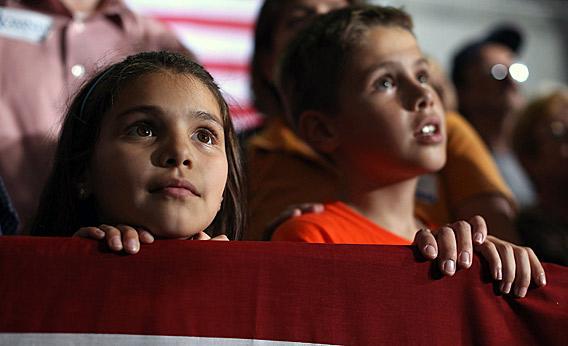When President Obama learned that the 6-year-old daughter of Rolling Stone interviewer Douglas Brinkley supported his candidacy, he responded, “[K]ids have good instincts. They look at the other guy and say, ‘Well, that’s a bullshitter, I can tell.’ ” Are children really that good at sniffing out lies?
No. Lie detection is a complex skill that improves with age, and studies have repeatedly shown that young children are exceptionally poor at identifying deception. In a 1982 study published in the journal Child Development, for example, participants listened to a series of speakers describing people they purported to like or dislike. Some of the speakers were telling the truth, while others were lying. Children in sixth grade performed worse than random chance in identifying the liars, while eighth-graders just about matched random chance. Twelfth graders and college students demonstrated significantly more skill at detecting deception.
President Obama has bought into a widespread myth that children have an intuitive ability to sniff out deceit. This perception likely has to do with young children’s disinclination to tell lies. When children participating in studies are given disappointing gifts, for example, the younger subjects are far more likely to lash out at the giver.
Personal honesty, however, bears no relationship to one’s ability to detect lying in others. If anything, understanding the circumstances under which lying is appropriate enhances one’s lie detection skills. In the aforementioned 1982 study, young children were more skeptical when a speaker said she disliked someone, while the adult participants were more likely to adjudge positive descriptions as lies. This distinction shows the importance of life experience in lie detection: Most adults have, at one time or another, falsely claimed to like someone, and recognize this as a circumstance in which people are likely to lie.
Children have a life experience advantage with one particular kind of dishonesty: lies after misdeeds. In a small number of studies, children have shown an ability to recognize that a person is inclined to lie after breaking a rule, stealing, or damaging someone else’s property.
Even so, it appears that 6-year-old children aren’t even fully capable of conceptualizing a lie. Developmental psychologist Jean Piaget showed that young children don’t understand the importance of a speaker’s intent in lying, and many kids describe honest misstatements and even profanity as “lies.” It’s not until at least age 8, or perhaps even 10, that children begin to understand that a statement is only a lie when the speaker intentionally misleads his audience. Adolescence appears to be a watershed period in the development of lie-detection skills. Studies show that, during this period, children begin to describe friends and family in terms that incorporate the internal thoughts and feelings of others, rather than simply their own subjective perceptions. Developing an interest in other people’s mental inner-workings helps children understand when and why people prevaricate.
There is a small body of research suggesting that babies are capable of telling if someone is untrustworthy, even if they’re not particularly good at detecting a lie. In a 2011 study, babies watched as adults looked into a box, expressed excitement, and invited the child to look into the box as well. When the box turned out to be empty, the babies were less likely to imitate the adults’ behavior in repeat experiments.
Got a question about today’s news? Ask the Explainer.
Explainer thanks Bella DePaulo, author of Behind the Door of Deceit: Understanding the Biggest Liars in Our Lives.
